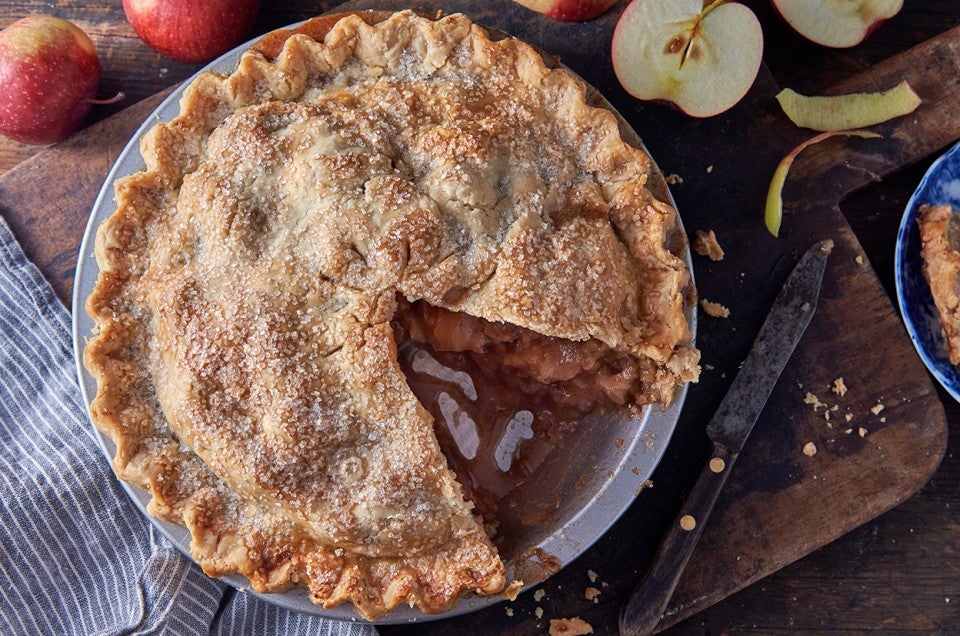Gluten-Free Apple Pie
Baking gluten-free? Don't abandon your favorite autumn dessert! This gluten-free apple pie is so good, you'll want to serve it to all your guests — not just those avoiding gluten.

Baking gluten-free? Don't abandon your favorite autumn dessert! This gluten-free apple pie is so good, you'll want to serve it to all your guests — not just those avoiding gluten.

To make the crust: In a medium bowl, whisk together the flour and salt. Add the shortening, working it in until the mixture is evenly crumbly.
Cut the butter into small (about 1/2") cubes. Add the butter to the flour mixture, and work it in roughly with your fingers, a pastry cutter, or a mixer. Don't be too thorough; the mixture should be very uneven, with big chunks of butter in among the smaller ones.
Add 4 tablespoons of water, and toss to combine. Toss with enough additional water to make a chunky, fairly cohesive mixture. It should hold together when you gather it up and squeeze it in your hand.
Divide the dough into two pieces, one about twice as large as the other. Then gather each half into a rough disk. Smooth the disks; it's OK if they have a few cracks in the surface.
Wrap in plastic, and chill for 30 minutes, or up to overnight. Or wrap in aluminum foil over the plastic, and freeze for up to 2 months. When you're ready to make pie, remove the crust from the refrigerator or freezer, leaving it wrapped. Allow it to thaw (if it's frozen) or warm a bit (if it's been chilled longer than 30 minutes), until it's softened enough to roll, but still feels cold to the touch.
To make the filling: Combine the sliced apples and lemon juice in a large mixing bowl.
In a small bowl, whisk together the sugar, flour, cornstarch, salt, and spices. Sprinkle the mixture over the apples, and stir to coat them. Stir in the boiled cider (or apple juice concentrate) and the vanilla, if you choose to use it. Set the filling aside while you prepare the crust.
Preheat the oven to 425°F.
Lightly grease a 9" pie pan that's at least 2" deep. This will make serving the pie easier after it's baked.
Roll the larger piece of pastry into a 13" circle. Transfer it to the prepared pan, and trim the edges so they overlap the rim of the pan by an inch all the way around.
Spoon the apple filling into the pan. Dot the top with the diced butter.
Roll out the remaining pastry to an 11" circle. Carefully place the pastry over the apples. Bring the overhanging bottom crust up and over the top crust, pinching to seal the two and making a decorative crimp. Prick the crust all over with a fork, to allow steam to escape. Or cut decorative vent holes, if desired.
For extra crunch and shine, brush the top crust with milk (or an egg white beaten with 1 tablespoon of water), and sprinkle with coarse sugar.
Refrigerate the pie for 10 minutes, to firm up the crust, while the oven finishes heating.
Place the pie on a parchment-lined baking sheet. Bake the pie for 20 minutes, then reduce the oven temperature to 375°F and bake for 40 minutes more, until you see the filling bubbling inside the pie (and perhaps dripping onto the parchment). Check the pie after half an hour of baking time, and cover the edges with foil or a pie shield to keep them from browning too quickly, if necessary.
When the pie is done — you should see the filling bubbling vigorously, either around the edges, or via any decorative vents — remove it from the oven.
Cool the pie completely before slicing — really. Cutting any fruit pie that's still warm is a messy business. The filling continues to thicken as the pie cools, and if you cut it too soon it will run out all over the place. It's better to bake the pie in advance, cool it completely, then warm each slice as needed after it's been cut.
Store any leftover pie, lightly covered, at room temperature for several days. Freeze for longer storage.
For the best apple flavor, use more than one variety of apple in your filling. Use apples that will hold their shape during baking: Jonagold, Granny Smith, Ginger Gold, Cameo, Northern Spy, and Delicious are some good choices.
Note that our Apple Pie Spice isn't certified gluten-free: it's packed using equipment that also processes wheat.
Be aware: Some of your baking ingredients can be a hidden source of gluten. Learn more at our blog post: For gluten-free baking, think beyond just flour. For additional information on King Arthur-produced products, read the complete details of our allergen program, including our contact-prevention practices.


